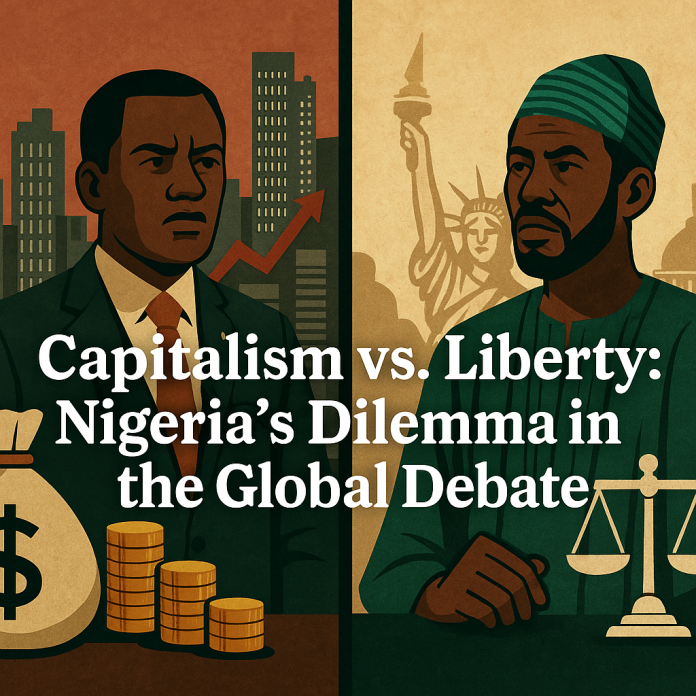Newspot Nigeria Editorial
The debate over whether capitalism enhances or erodes liberty is no longer confined to Western intellectual circles. It’s a pressing question that Nigerians, too, must confront amid rising inequality, weakening democratic institutions, and a wave of privatization that has eroded public confidence. Robert Kuttner’s Capitalism vs. Liberty, published in The American Prospect, offers a sobering critique of hyper-capitalism—one with uncomfortable parallels to Nigeria’s unfolding economic path. While we are not yet entrenched in the same model of neoliberalism that defines the U.S., our trajectory suggests we may be heading there—and not in a good way.

Capitalism has undeniably powered innovation, attracted foreign investment, and created billionaire entrepreneurs—even in Nigeria. From the tech clusters in Yaba to the global spread of Nollywood, market competition has fueled creativity, ambition, and job creation. In theory, capitalism offers people the freedom to choose, to own, and to profit from their efforts. It promotes efficiency, rewards merit, and reduces dependence on the state—a compelling argument in a country where public institutions remain riddled with corruption and inefficiency.
A clear example is the liberalization of Nigeria’s telecom sector, which led to a mobile revolution and democratized access to financial and communication tools. This transformation was driven not by socialism, but by capitalist incentives backed by minimal regulation. Many argue that deeper market reforms—privatizing sectors like electricity, transport, healthcare, and education—could unleash the kind of accelerated growth seen in parts of Southeast Asia.

Yet, as Kuttner warns, capitalism without social guardrails eventually consumes the liberty it promises. Nigeria’s own experience bears this out. Our privatization of electricity supply has yielded neither stable power nor improved service—only the shift of public failure into private monopolies. Likewise, the commodification of education, healthcare, and even personal security has pushed the poor further to the margins. In such a system, liberty belongs only to those who can afford it.
Worse still, Nigerian capitalism functions within weak institutions, enabling elite capture. Wealth here doesn’t trickle down—it consolidates among a few politically connected individuals. Much like in the U.S., deregulation and financialization have produced our own breed of “oligarchs in agbada”—a powerful class that shapes policy, controls media narratives, and bends the rules to its advantage. In such a setting, liberty for the masses becomes an illusion.

Kuttner suggests that liberalism alone cannot withstand the power of unchecked capitalism, arguing instead for a transition to democratic socialism. While some Nigerians recoil at the word “socialism,” scarred by failed experiments of the post-colonial era, what’s being proposed is not state control but social ownership. Think of cooperative housing, public broadband, community land trusts, and nonprofit healthcare. These are not foreign ideologies—they’re pragmatic tools for social equity.
The goal isn’t to discard markets, but to build a resilient mixed economy—where public purpose balances private profit. Like Sweden. Like Red Vienna. Nigeria must build social infrastructure, not just safety nets, through serious public investment in health, education, transport, and energy. Only then can liberty be more than a privilege of the elite.

In a nation where millions live in poverty while a few thrive extravagantly, the limits of capitalism are already visible. But the path forward doesn’t lie in rejecting markets or embracing old models of state domination. What we need is courage—to craft policies that decentralize wealth, promote collective ownership, and make liberty tangible for all.
As Kuttner reminds us, the rock may roll back down the hill. But like Sisyphus, we must keep pushing—driven by hope, solidarity, and vision.
This editorial is brought to you by Newspot Nigeria, as part of our series on governance, justice, and the future of liberty in Africa.
Share your story or advertise with us: Whatsapp: +2347068606071 Email: info@newspotng.com

















